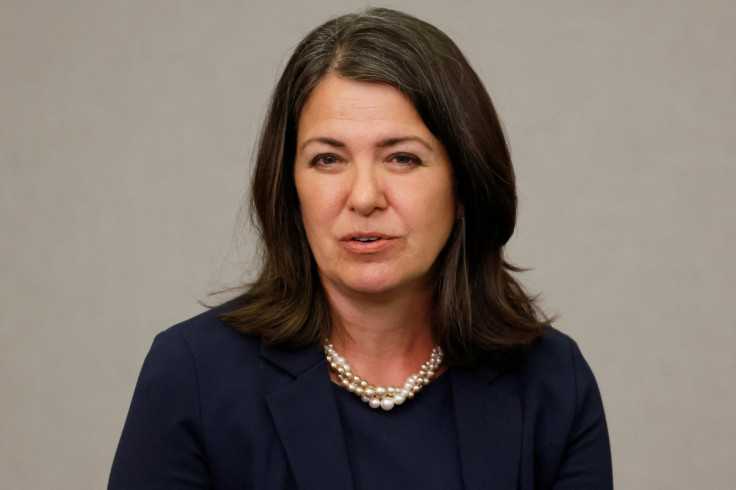Alberta Premier Danielle Smith Struggles To Broaden Appeal Ahead Of May Election

Four months into her premiership, Alberta's conservative leader Danielle Smith has sewn up the right-wing vote with her combative stance against Canadian Liberal Prime Minister Justin Trudeau, but faces a tougher time wooing moderate Albertans ahead of the upcoming provincial election.
The outcome of the May 29 vote in Canada's main oil-producing province will have a huge bearing on Canada's ambitious climate goals of cutting emissions 40% to 45% from 2005 levels by 2030.
A win for Smith's United Conservative Party (UCP) may force Ottawa to make concessions on key decarbonization policies including an oil and gas emission cap and clean electricity regulations that have sparked resistance from the government of Alberta, Canada's highest-polluting province.
After lagging in polls in 2022, the UCP has narrowed the gap with Rachel Notley's left-leaning New Democratic Party (NDP). A February Leger poll showed the NDP holding only a narrow lead province-wide and trailing in the key battleground of Calgary, while an Abacus Data poll had the UCP taking the lead.
The turnaround came after Smith, an outspoken former radio show host, replaced the deeply unpopular Jason Kenney as UCP leader and premier in October and consolidated right-wing votes in the traditionally conservative province.
But political analysts say she could struggle to appeal to the roughly 25% of Albertans who polls show are undecided.
"We have a certain segment of conservative swing voters who really do not like Danielle Smith," said Marc Henry, president of Think HQ Public Affairs, whose late January poll also showed the UCP nudging ahead.
"They may not be able to bring themselves to vote for the NDP, but they could not vote or spoil their ballot."
Henry said turnout will be a determining factor, particularly in Alberta's corporate oil hub Calgary. Rural Alberta tends to vote conservative while the provincial capital Edmonton, home to a larger proportion of public sector workers, usually votes NDP.
Smith came to power following a leadership campaign that slammed the federal and provincial COVID-19 pandemic response as too stringent, championed Alberta's energy sector and successfully tapped into Alberta's long-standing grievances about federal over-reach by promising to stand up to Ottawa.
But she has watered down or walked back many of her most controversial proposals, including Alberta sovereignty, pardons for COVID-19 lawbreakers and a proposed oilwell clean-up program that would have given royalty breaks to producers.
Jared Wesley, a politics professor at the University of Alberta in Edmonton, said Smith's policies are proving less radical than her rhetoric because she is being limited by Alberta law and Canada's constitution, rather than because she is pivoting to tap into mainstream support.
"The interesting question is does being rebuked like this make her more appealing to the general public? For a centre-right supporter, looking at how the institutions of Alberta democracy keep her in check, does that make them more likely to vote for her?" Wesley said.
Since taking office, Smith has come under fire for comments on discrimination against unvaccinated people, her government's dealings with First Nations Indigenous groups and misrepresenting how many jobs are at risk from Canada's energy transition.
Lori Williams, a politics professor at Calgary's Mount Royal University said Smith's missteps have helped draw attention away from the NDP.
"Because of the controversies that have dominated headlines for months the NDP has not been getting its messaging out as effectively," Williams said. "Paradoxically that might be a strategy that works for the UCP."
© Copyright Thomson Reuters 2024. All rights reserved.





















